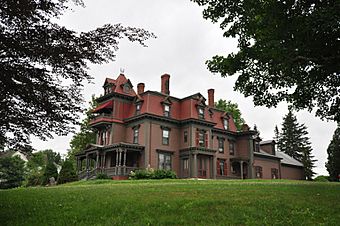William M. Nash House facts for kids
|
William M. Nash House
|
|
|
U.S. Historic district
Contributing property |
|
 |
|
| Location | River Rd., Cherryfield, Maine |
|---|---|
| Area | 0.5 acres (0.20 ha) |
| Built | 1888 |
| Architect | Allen, William A. |
| Architectural style | Greek Revival, Queen Anne |
| Part of | Cherryfield Historic District (ID90001467) |
| NRHP reference No. | 83000477 |
Quick facts for kids Significant dates |
|
| Added to NRHP | January 4, 1983 |
| Designated CP | October 1, 1990 |
The William M. Nash House is a historic home in Cherryfield, Maine. It stands on River Road. This house has been changed and updated many times over the years. Today, it looks like a fancy Second Empire style house from 1888.
The famous architect William A. Allen designed this version of the house. He was from Cherryfield. The house was added to the National Register of Historic Places in 1983. This means it is an important historical building. It is also part of the Cherryfield Historic District. The house is currently owned by Gordon and Cynthia Kelley.
What the Nash House Looks Like
The Nash House is a large building. It is located where River Road meets School Street. This spot is on the west side of the Narraguagus River. It is right across from the main part of Cherryfield village.
The house is made of wood. It has 2 and a half stories. A special roof called a mansard roof gives it a full third floor. The front of the house has three sections. A tall, three-story tower sticks out from the middle. A porch runs across the front of the house. It has fancy turned posts and decorations. There is also a balcony on the second floor of the tower.
A House with Many Styles
The exact age of the oldest parts of this house is not known. It started out as a smaller, simpler house. This was a 1 and a half story Cape style home. Later, a man named James Moore changed it. He turned it into a Greek Revival style house. This style often looks like ancient Greek temples.
William Nash, who was James Moore's son-in-law, later owned the house. In 1888, William Nash hired local architect William Allen. Allen updated the house to the Second Empire style. This style was popular in the late 1800s. It often features mansard roofs and decorative details. We don't know if any parts of the original Cape house are still there today. William Allen designed many buildings in Cherryfield. The William M. Nash House is known as one of his most detailed and creative designs.



